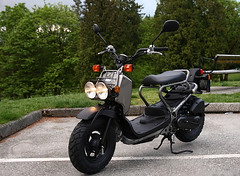I was stopped on a red light in Burnaby when a woman in a van next to me rolled down her window and said "My bike won't start. Do you know what to do?"
To be honest I was a bit stunned. Where do I start? Just seconds left on the red light...
We had a quick chat and went our separate ways but that got me thinking. How many people take the easy way out and not prep their bikes for winter storage? All it does is cause headaches come spring time. It's really easy and doesn't need to be time consuming or costly.
Here is what is commonly recommended and what I follow:
Go to your nearest Canadian Tire (or Walmart, or whatever store has a car section) and buy a $5 bottle of fuel stabilizer.
That's the bare minimum.
If you feel like actually getting dirty then you should also
All in all I've been just riding 4 years now but these few steps ensure your bike will start each spring without costly repairs or towing to your mechanic.
Ride safe.
CR
tags: moto motorcycle "motorcycle maintenance" "winterization" winterize "motorcycle storage" "motorcycle winter storage" "winter maintenance"
